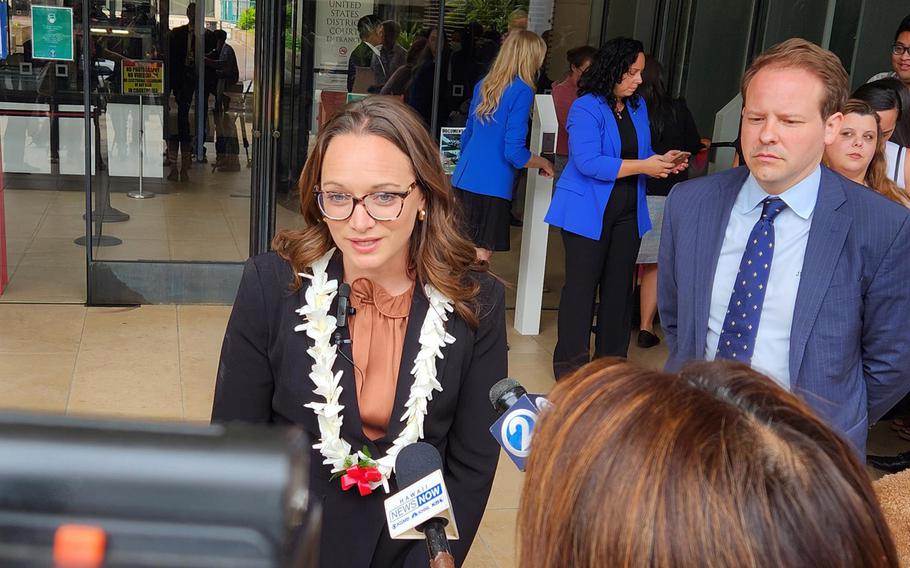
Plaintiffs’ attorney Kristina Baehr speaks with reporters outside U.S. District Court in Honolulu, May 13, 2024, following the conclusion of the trial phase of Feindt vs. United States. (Wyatt Olson/Stars and Stripes)
HONOLULU — An attorney representing 17 plaintiffs suing the federal government over a jet fuel leak that contaminated their water in 2021 asked a federal judge Monday to award between $225,000 and $1.25 million to each individual, depending upon the degree of their injuries.
Plaintiffs’ attorney Kristina Baehr laid out the range of compensation sought during closing arguments in the two-week trial phase of Feindt vs. United States in U.S. District Court.
Speaking with reporters outside the courthouse after the trial ended, Baehr said awarding damages to her clients could deter similar disasters.
“Tort law has two purposes: deterrence and compensation,” she said. “And you can’t have deterrence without compensation.
“Our clients came not to punish, but to protect – to protect their families, to protect the water, to protect this land, and ultimately, to protect their country. Because this is a patriotic exercise, to hold the United States to account.”
The plaintiffs allege their injuries resulted from a November 2021 leak at the Red Hill Bulk Fuel Storage Facility that contaminated the Navy water system serving their homes.
Baehr said she was seeking $400,000 for past pain and suffering for Nastasia Freeman, a mother of three who is central to the plaintiffs’ case.
Freeman, who no longer lives in Hawaii, testified that she has an epilepsy condition that had been dormant for several years. Following the contamination, the condition reemerged and she began having seizures.
Freeman should also be compensated another $650,000 for future pain and suffering and for mental anguish, Baehr told the judge.
Baehr asked for almost $600,000 for Beau Jessup, now 18, to compensate for pain and suffering, mental anguish, impairment and therapy related to medical conditions that he testified would prevent him from joining the military as he had planned.
In his closing, Justice Department attorney Eric Rey reiterated the defense’s contention that the contamination was too short-lived to have caused deep and lasting harm to the defendants.
“The science simply does not support that this persisted beyond two days of exposure,” he said.
The plaintiffs stopped drinking the tap water or using it altogether within days of the first complaints of tainted water and therefore could not have experienced excessive exposure to the contamination, Rey said.
U.S. District Court Judge Leslie Kobayashi is hearing the case without a jury.
Attorneys on both sides are scheduled to submit post-trial briefs in June, after which Kobayashi will deliberate before issuing a decision.
The 17 plaintiffs are among about 7,500 individuals represented by Baehr’s Just Well Law, based in Austin, Texas, and Hosoda Law Firm in Hawaii.
The judge’s decision on these first 17 bellwether plaintiffs could determine whether those additional cases are headed to trial or are settled.
The Feindt trial began April 29, more than two years after thousands of residents of military housing on and around Joint Base Pearl Harbor-Hickam were forced to temporarily relocate because of the jet fuel-contaminated tap water.
The fuel emanated from a spill at the Red Hill Bulk Fuel Storage Facility near the joint base that seeped into one of three wells used by the Navy for its water system.
Expert witnesses for the plaintiffs testified that a significant amount of jet fuel found its way into the homes of residents using the Navy’s water.
Medical experts testified that a host of conditions experienced by the plaintiffs — everything from headaches, dizziness and nausea to tremors and neurological problems — stemmed from exposure to the tainted water.
Defense experts testified that the presence of jet fuel in the water system was too scant and too brief to have caused any harm to residents.
A toxicologist for the government defense testified that the medical conditions experienced by the plaintiffs were preexisting or induced by stress.
Kobayashi has reiterated throughout the trial that she is only trying to determine the cause of the plaintiffs’ medical problems and how much they should be compensated.